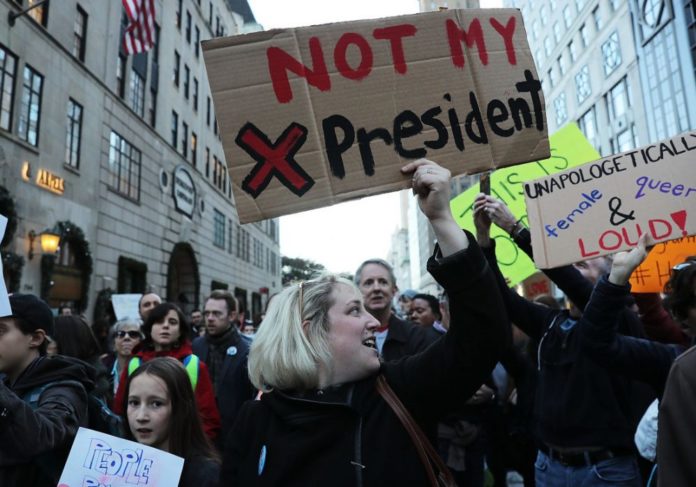A few weeks ago, Donald Trump responded to Meryl Streep’s insults by calling her overrated. Some fact checks came out saying that Streep, in fact, had won many awards. The Associated Press’ “Meryl Streep overrated? Donald Trump picks a decorated star,” was one such example. Four of the seven paragraphs to the story listed awards and honors she’d received.
As Victor Morton noted, “‘She has won a bunch of awards’ isn’t even a prima-facie rebuttal of the claim ‘she is overrated’.” He added, “If anything, ‘She won a bunch of awards’ is a necessary precondition for being ‘overrated,’ i.e. rated highly in the first place.”
Exactly. If journalists involved with the “fact” “check” enterprise are capable of self-reflection, they should begin understanding why so many people find it a waste of time at best. Here are a few other examples just from the past few days.
1) Palestinians Are Not All the Same
The New York Times ran what it claimed was an Associated Press “fact check” on David Friedman, President Donald Trump’s pick to be U.S. ambassador to Israel. Here’s how it began, with a characterization of a Friedman statement and then “THE FACTS”:
FRIEDMAN:He said Palestinians had failed to ‘end incitement’ of violence, and terrorism had increased since the Oslo Accords in the 1990s, intended to be a stepping stone toward Palestinian statehood.
THE FACTS: Not all Palestinians are the same.
That’s really what it says. You don’t say, Associated Press. Thanks for that brilliant piece of information about which we were all unaware. If you are a reader looking for facts to gauge whether terrorism had increased since Oslo, you are completely out of luck.
2) The Ninth Circuit
PolitiFact “fact” “checked” a Sean Hannity claim that “The United States Court of Appeals for the 9th Circuit is ‘the most overturned court in the country.’” They rated it patently “false.”
Researcher Lauren Caroll said she used SCOTUSBlog’s Supreme Court statistics archive to evaluate the claim and found that the Supreme Court reversed about 70 percent of the cases it took between 2010 and 2015. The Supreme Court reversed 79 percent of cases from the Ninth Circuit, which put it in third place for most reversed court.
But a reader noticed something interesting: the fact check didn’t mention the sheer number of reversals even though the researcher would have had to know the number of reversals to calculate the rate of overturning. And if you just look at the actual number of reversals, not only is the Ninth Circuit the one with the highest number, it’s not even close. From 2010-2015, the Ninth Circuit was overturned at the Supreme Court 77 times. The next highest was the Sixth Circuit, with 28 reversals.
Here are the overturned decisions by the circuit court of appeals from 2010-2015:
First: 6
Second: 16
Third: 19
Fourth: 12
Fifth: 27
Sixth: 28
Seventh: 10
Eighth: 16
Ninth: 77
Tenth: 10
Eleventh: 21
DC: 10
Federal: 19
In fact, in each year of the sample, the Ninth Circuit had the most reversals. The reader notes: “I suppose one could argue that the percentage of reversals is cases heard by the Supreme Court is more significant than the raw number of reversals (although [a] quote in the article seems to caution against looking at the rate of reversal percentage), but the article does not even acknowledge the story told by the raw data. Moreover, it was necessary to look at the raw data in order to calculate the percentages of cases overturned, so the decision not to mention this in a purported ‘fact-checking’ article is curious, to be charitable, particularly since the statement being evaluated makes no claims with respect to percentages. The upshot is that the article does a nice job of proving Mark Twain’s point that the three types of lies are lies, damn lies, and statistics, as it uses a statistical analysis of questionable merit to ‘disprove’ a statement that was literally true.”
PolitiFact continues to be a place where you can say something literally true and get a false rating (if you are a non-liberal).
3) An Abortion of a Fact Check
Our next example of a “fact” “check” failure is a Snopes piece on whether Planned Parenthood rewards employees for promoting abortion services. Journalist Lila Rose interviewed former Planned Parenthood employees who said they were expected to increase the revenue-generating abortion portion of the business. She also had a document purporting to show a reward for one clinic exceeding its abortion visits relative to a prior period of time. Therefore, the check couldn’t determine that the allegations were “false.” Instead, they were rated “unproven.”
But where things got really weird is when the piece used a completely unrelated legal case to discredit one of the women who had made the claim. And then Snopes got the facts wrong in that case.
.@snopes says @AllianceDefends lost this Medicaid fraud case v PP. Which is funny, b/c I argued and won that appeal. http://www.snopes.com/planned-parenthood-abortion-quotas/ …
FACT CHECK: Does Planned Parenthood Enforce ‘Abortion Quotas’?
An anti-abortion activist revived claims that Planned Parenthood maintains “abortion quotas.”
snopes.com
Whoops.
Snopes used Planned Parenthood talking points in an attempt to discredit Sue Thayer. They claimed she was unsuccessful in a lawsuit she brought alleging Medicaid fraud. But the lawsuit is ongoing and was reinstated by the Eighth Circuit.
Had they reviewed the actual video they were purporting to check, they would have known this. They would have known this if they’d looked up her congressional testimony. Heck, “researcher” Kim LaCapria didn’t contact Thayer, Mattox, the Alliance Defending Freedom, or Lila Rose’s LiveAction before running the “fact” “check” that was nothing other than unrelated Planned Parenthood talking points. It’s a stunning lack of work for an organization that is supposed to fact check the fake news on Facebook.
4) ‘Actually,’ Regulations Create Jobs
For our last entry, we head over to the Washington Post, which has a piece headlined “Trump supporters see a successful president — and are frustrated with critics who don’t.” Authored by Jenna Johnson and Dave Weigel, the piece is about how Trump voters are frustrated at media hostility to Trump’s successes. It positively drips with condescension, as this sample section shows:
Several people said they would have liked to see more coverage of a measure that Trump signed Thursday that rolled back a last-minute Obama regulation that would have restricted coal mines from dumping debris into nearby streams. At the signing, Trump was joined by coal miners in hard hats.
‘If he hadn’t gotten into office, 70,000 miners would have been put out of work,’ Patricia Nana, a 42-year-old naturalized citizen from Cameroon. ‘I saw the ceremony where he signed that bill, giving them their jobs back, and he had miners with their hard hats and everything — you could see how happy they were.’
The regulation actually would have cost relatively few mining jobs and would have created nearly as many new jobs on the regulatory side, according to a government report — an example of the frequent distance between Trump’s rhetoric, which many of his supporters wholeheartedly believe, and verifiable facts.
Oh, where, where, where to begin?
First off, it’s absolutely true that most national media completely messed up by spending all of their Trump coverage last Thursday on his press conference instead of the far more important regulatory reform. It’s not just important in an economic sense, but a political sense. You bet your patootie that Republicans in mining states were elated by this change to proposed regulations. Also, seeing miners in hard hats praising a Republican president was far more significant than Round 242 of the war with the media.
Second, Nana is correct that the industry projected job losses for 70,000 miners. In fact, she lowballed it. The actual prediction was a loss of up to 78,000 coal mining jobs, on top of the 40,000 already lost since 2011. The National Mining Association produced a report that the rule could lead general coal-related employment to plummet by 281,000 positions, including in related fields.
As we investigate the last sentence excerpted above, let’s note that the reporters smugly wrote “actually” in their “fact” “check” of Nana, the 42-year-old naturalized citizen from Cameroon. Not only do they appeal to a government report they don’t even bother to identify, they put complete trust in it. They trust, with not a smidgen of doubt, that the government that designed a given regulation is the best, if not only, judge of its impact. They refer to a speculative report about the future — about the future — as “verifiable facts.”
Here’s an idea for Johnson and Weigel: Read this Michael Crichton essay until you understand it. You can’t assert that a prediction, of all things, is a verifiable fact. That would be true even if central planners had good track records of looking out for all unintended consequences. The writing duo doesn’t bother to quantify “relatively few.” Relative to what, you might ask. If you are one of the vast majority of Americans who don’t trust the media, they have given no information that you can use to check whether what they’re saying is true.
Even that’s not the big problem with this. The big problem is the idea that a “relatively” minor loss of mining jobs is no big deal because there will be “nearly as many new jobs on the regulatory side.” Is this some kind of a joke … about how Trump won? That elite think jobs can go from the mining sector to the … regulatory sector?
Apart from the abject ignorance required to imagine that the downsides of losses in coal mining jobs are easily balanced in their communities by new jobs in regulating the affairs of other people, there’s another issue. Say what you want about coal miners, they are producing a real thing that powers much of our economy. Electricity generation, steel production, cement manufacturing, and liquid fuel are some of the uses of coal.
What would you say regulators produce?
In short, that “actually” line may be the stupidest thing I’ve read in a year.













